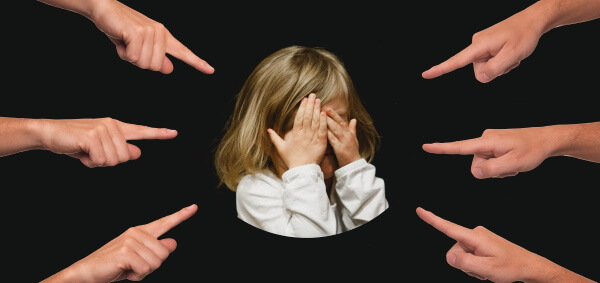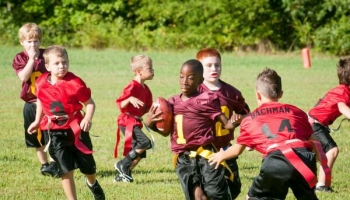
- Start here
- Types of Predatory Situations
- Pedophiles and child pornography rings
- Online bullying
- Suicide groups
- What dangers are out there awaiting your child?
- Online Platforms where kids encounter predators
- The most vulnerable age groups
- How do kids become vulnerable to online predators?
- How do predators initiate contact and groom kids?
- Is your child at risk? Sings to watch out for
- How to talk to your child about recognizing predatory behavior
- What if the predator is an authority figure?
- Tips to protect your child from predators
- How far should you in monitoring your child’s online interactions
- Things that kids do to throw parents off track
Your guide to protecting your child from predators
It’s every parent’s nightmare – their child falling prey to an online predator. You naturally want to protect your child from such evil persons, but this is extremely difficult in a world where we’re all permanently online. You buy your child a mobile phone so you can be in touch at all times, but who else might try to get in touch with your child using the phone you bought for his or her protection?
Online predators are not as numerous as mass-media would have you believe. Often, information about a victim is copy/pasted from one site to another and shared by predators and pedophiles. The possibility of having often compromising information about a victim shared across the dark web should be enough to scare the wits out of any concerned parent. The potential danger out there is real. There have been cases of children groomed into meeting in real life with persons they got in contact with online – children who ran away with grown-ups. There are also children bullied online and driven to suicide.
These things happen and a parent needs to understand the dangers and warn their kids about them.
Back to the top
Types of predatory Situations
Pedophiles and child pornography rings
The most common danger children are faced with over the Internet is pedophiles hunting for potential victims. Online predators are very skilled at winning trust as this is the essential part of their sick game, and they are ready to spend as long as it takes to become friends with their target. In many cases, the predator may get to the point where he asks for nude pics for his own sexual gratification or to distribute them in child pornography networks.
Once a child falls for this there is no escape as he or she will be blackmailed into sending other images, under the threat that predators will expose them and send the pictures to their parents.
In some cases, the predator manages to convince the victim to meet him or even run away from home. There have been numerous cases of teenage girls running away with older men they’d met online.
Back to the top
Online bullying

Another very serious danger is online bullying, in which a child becomes the target of vile abuse from his peers. Students being mean to a kid in the schoolyard is bad enough, but the Internet makes it possible for some really aggressive types to continue the abuse when the victim is at home. The child bullied in school used to be safe once he got home, but not anymore. He can be called names, told he is ugly, stupid, and totally worthless in chats or text message groups, and the damage done is just as effective, as other children in his class can, and will likely, hear of his public humiliation.
Back to the top
Suicide groups
There is also the risk of a child falling prey to sick individuals who find a thrill in abusing vulnerable children until they drive them on the verge of suicide. In 2015-2016 there was a global alarm over the so-called Blue Whale suicide game, in which children were allegedly given increasingly dangerous tasks until they reached level 50 and told to end their own lives. It is a murky story and there is little proof that over 100 children committed suicide because of this game, but the fact is that the Blue Whale scare is making a comeback. Persons hiding behind the Blue Whale handle have been reported in various chats frequented by children in June and July 2020. While this might very well be a false alarm, the real danger is that it prompts kids to openly discuss suicide and depression while the unsuspecting parent thinks the child is playing a game.
Equally dangerous are suicide communities hiding in dark corners of the Internet, communities where suicide is viewed as the preferred solution to put an end to a life of misery. A depressed teenager will be encouraged to take his own life and be given tips on the best way to do it. This happened to a girl called Suzy Gonzales who committed suicide after the members of such a community told her how to get a lethal dose of potassium cyanide. The chilling thing is many of the members in such groups don’t end their own lives, what they do is cheer on those who are desperate enough to do it.
Back to the top
What are the dangers for your child?

Online predators can destroy a child’s life in many different ways. Most people fear their child could be kidnapped by a pedophile met online, but the real danger is that a predator will convince the victim to run away voluntarily.
Technically, it is possible for a stalker to identify the town a kid lives or the school he attends, but online predators rely on grooming their victims.
A child who has fallen victim will be severely affected even if he or she doesn’t run away. Imagine a gullible child sending a nude photo to someone, that kid will become obsessed with the fear of being exposed and will practically be at the mercy of his tormentor. This is called sextortion and it will affect the child’s mental well-being, social life and his grades.
Teenagers suffering from depression and the loners are particularly at risk of stumbling into these so-called suicide groups. What was just a distant thought can easily become a solution for a vulnerable child who discovers other people openly discussing the merits of suicide?
Back to the top
Online platforms where kids encounter predators
Any platform with a chat or messaging system is potentially dangerous. One experiment found that dozens of men were sending inappropriate messages to a fictitious teenager within a few hours of the fake profile going online. Just post a couple of sexy pictures, as most teenagers do these days, and this will attract the interest of online predators.
Such a thing can happen on Facebook, Instagram, or Snapchat, but also in the chats on popular game servers. Minecraft, Roblox, Clash of Clans are very popular among children, and predators can try and hunt for victims on these platforms, although the claims that these things do happen seem to be exaggerated. Most platforms dedicated to kids use artificial intelligence (AI) to scan for potentially harmful messages, so children should be safe. However, many children play games that are not targeted to a specific age group, and on those servers, there is little protection for vulnerable children.
There are also all the messaging apps where a child can get in contact with God knows who while a parent believes the kid is talking to a school friend.
Back to the top
The most vulnerable age groups

According to experts, children between 12 and 15 are the most vulnerable when it comes to online predators. Not surprising, girls are more at risk than boys.
The main reason this group is targeted by online predators is that children this age use their devices more and may be unsupervised.
Not all children under 12 have their own laptops or mobile phone, so they’re more likely to play a game on the family computer and the parents can and usually do keep an eye on them.
Teenagers are a different species, they all have their phones and are very fierce about their privacy. They naturally want to socialize more and experiment, which makes them excellent candidates for online grooming. If you look at media reports on such cases most victims lured by Internet pedophiles were teenage girls who were convinced to run away with older men, in some cases much older men.
Back to the top
How do kids become vulnerable to online predators?
In most cases, it starts with the simple thrill of having a conversation with a mysterious stranger. Teenagers, particularly girls, have their heads full of romance and they’re curious about adult relationships.
It’s the age of uncertainty and self-doubt and the attention of a stranger can be most flattering; for example, some random guy starting a conversation with a comment on how good she looks in a photo. There are millions of teenagers obsessed with sexy selfies. Have you ever watched girls posing in very sensual positions by the side of the pool? Those pics are meant to be uploaded so their friends can like them.
However, online predators won’t hesitate to contact a girl they fancy. A girl will welcome the attention as it makes her feel validated. She looks great and men like her. Unfortunately, you cannot blame a teenager for thinking like this. This is the world adults created for her, a world obsessed with looks, a world where you can become a star like the famous Kim Kardashian by having, amongst other things, the biggest butt.
Some girls will walk into such a trap because of all the peer pressure they face. Having a secret admirer or an online boyfriend is something to brag about or, at least, it makes you feel good about yourself.
The girls who are very popular within their social circle are less vulnerable, as they already have many admirers. The so-called “ugly duckling” is often more vulnerable as she tries very hard to look just as good as the resident school queen and finds herself falling short. Make no mistake about this, an online predator will easily spot these vulnerable girls who crave attention. Remember that at this point in their lives, girls are less likely to have yet to come into their own in terms of confident about who they are, regardless of what others think.
But it’s not always a stranger. An older kid at the school can exploit such vulnerability just as well, lavishing attention on a girl a girl whose self-image makes her believe she’s not pretty enough, convincing her to send racy pics. Once that happens the girl is in serious trouble, as someone who knows her and her friends has all the means to make her life miserable. It’s not only perverts who ask for nude pictures, but children also dare one another to do so until the pics fall into the wrong hands.
Finally, some kids engage in dangerous online relationships just because they’re at that age when they’re prone to reckless behavior. Kids being kids without realizing the person they’re playing is not a kid and that is not a game!
Back to the top
How do predators initiate contact and groom kids?
Many parents believe that predators pose as young people to win a child’s trust, but this is rarely the case. According to one study, only 5% percent of online predators pretend to be young. That’s because an older guy is so much more interesting to an insecure teenager.
In some cases, an online predator will approach a child in a very blunt manner, bringing up sex and nude pics from the very beginning.
However, many predators are more subtle than that and will first establish a friendship with the victim. A conversation can start with an innocuous dialogue about games and sports, allowing the predator to pick up some clues about the child’s vulnerable spot. Is the kid lonely? Does he fight with his parents? Is he troubled because his parents are divorcing? Is he struggling in school?
An online predator will pose as the sympathetic friend who will listen to his target’s problems until he wins the victim’s trust. A lonely child with few friends will come to rely more and more on this online friend until he finds himself completely in his power.
Back to the top
Is your child at risk? Signs to watch out for

Every child is potentially at risk, even the brightest, most outgoing very sociable one can fall victim to online predators. A 12-year old can be very smart, but is still a child. He’s innocent at heart and can be easily tricked into trusting a stranger!
Here are a few signs to watch out for:
- Your child becomes secretive and won’t share details about online activities.
- A child engaged in a secret relationship over the Internet will hide the screen when you walk in and take the phone everywhere so it doesn’t fall into your hands.
- Your child starts using a secondary phone or creates an alternate profile on social media.
- Your child blocks you on social media so you cannot see his or her friends.
- The child spends most of his time on the phone or computer and seems to be constantly waiting for a message.
- A new message makes your child visibly sad or on the contrary too happy for it to be just a funny meme from a friend.
- The child becomes withdrawn, very nervous, and quick to pick up a fight with you. That can be typical teenage behavior, but it could also be a sign there’s something unusual going on. Often enough, an online predator will exploit any grudge a child might have to turn him against you so he can be in a position of trust.
- Your kid’s grades start falling for no reason.
- You see the child is talking to someone online and you don’t’ recognize the icon of their conversation partner as belonging to one of their friends.
- Your child starts using sexual terms or ideas you’ve never heard before, which they might have learned from an online predator.
- You see calls from numbers that do not belong to your child’s friends.
- Your child receives gifts he cannot or wouldn’t explain where they got them.
However, keep in mind that a child can be involved with an online predator without displaying any of these signs. On the contrary, that stranger will do his best to make the child happy!
Back to the top
How to talk to your child about recognizing predatory behavior
Many parents find it quite uncomfortable to talk about these things with their children, but this is a very dangerous attitude.
A lot of families have strict policies and carefully avoid their children being exposed to adult content or watching movies that do not have a PG-13 rating. When you try so hard to preserve their innocence, how can you tell a child one day – `Hey, beware of Internet predators, there are many sick guys out there wanting to have sex with you!`
Sounds terrible, but it is true and the only way to protect your child is to tell him or her about these things.
- Initiate a friendly conversation and use mild language so as not to upset a sensitive child. Explain to your child that there are many sickos out there, insisting on the fact that they are deranged and never to be trusted.
- The most important thing is to emphasize that you will never, under any circumstance, consider your child responsible if such a pervert approaches them. Online predators rely on the fact that the child will be ashamed to talk to his parents or they can convince the child he will be punished if he ever mentions anything about the secret conversations he’s been having online.
- Make it abundantly clear to your child that you know about these things, the police knows about these people and what they’re doing is bad.
What if the predator is an authority figure?
It doesn’t have to be a stranger. The person trying to groom a child may be someone he or she knows – a teacher or a coach. There have been many cases of teachers luring students into a sexual relationship. Many children these days are friends with their teacher on social media and it’s generally a good thing, not to mention quite necessary at a time when millions of children are forced into online schooling. You cannot interfere in this, but as an experienced adult you should be very careful when you hear a particular teacher is dedicating too much attention to a child, besides occasionally liking a photo, sending a birthday wish, or a message about homework.
Back to the top
Tips to protect your child from predators

- It is customary for parents to be friends with their children on social media, especially young children, who technically shouldn’t even be on Facebook but have profiles nevertheless. You can make this a condition to allow them to be on social media – either we’re friends, or you don’t get to be online. This will allow you to see who his friends are and that their interactions are probably childish. Stay out of his or her business! It’s the unwritten code of social media. Parents are not allowed to comment on their kids’ posts or, God forbid, talk to their little friends. Keep in mind that if you’re not too nosy you stand a better chance of being included in their circle of trust and being in the know.
- Educate your child about the risk of being contacted by online predators. Explain who these people are and how they operate.
- Talk to your child about nude pictures and explain how dangerous this is. Tell your child not to trust even a school friend as this other kid could send those pictures to anybody on their contact list.
- Instruct a child from a young age never to reveal personal information to people they meet online. Nothing – no real name, school they go to, home address. Explain to your child that any person asking for such information should be considered dangerous and he or she should end contact with that individual.
- Consider installing a monitoring system on your child’s laptop or phone. However, this is complicated and only works with younger children.
How far should you go in monitoring your child’s online interactions?
There are many apps and software programs that allow parents to monitor their child’s online activity. Most work by restricting access to pages with adult content or using safe search options. Few can offer access to their online conversations and this is where danger lurks.
Most of these apps are designed for parents who want to monitor Internet usage and limit the time spent online.
Limiting online activity works well with young children, but not with a teenager who sleeps with the phone on the nightstand. Such a child will resent being monitored and do anything to bypass any restrictions.
For instance, if a parent doesn’t allow a child to have a certain app on the phone, the children can learn how to hide it and give it an innocuous name.
Also, in this day and age, you cannot tell a child not to talk with his or her friends online, and you cannot look over their shoulders to see who they’re talking to.
Teenagers want privacy and monitoring their online activity will be seen as a direct violation of their rights. Keep in mind that in most cases their online activity is restricted to interacting with real-life friends. Online predators are a grave danger but they’re not as numerous as you might think. At the end of the day, it’s not worth ruining the relationship you have with your child by aggressively monitoring their activity just to protect them from a hypothetical danger.
Be your child’s friend and express interest in his or her online activities, have casual conversations about their friends as this is your best chance of getting a hint if there’s something dubious about their online activity.
However, when you feel there’s something seriously wrong with your child, go with your instincts. If you have reason to believe your child has become involved with a stranger over the Internet and they’ve been acting differently, you are entitled to break any privacy rule. Check out who your child is talking to online and see what sort of conversation it is. If there’s something seriously wrong, take action immediately even if your child swears never to talk to you again.
If you discover there is nothing to worry about, keep your mouth shut and make sure you don’t get caught in the act of spying.
Back to the top
Things that kids do to throw parents off track
Do you know what GNOC stands for? Get naked on camera! How about P911 or P999? That’s code for parents are watching. If you didn’t grow up in the world of LOL and BRB, you may have a hard time trying to decipher a coded conversation your child is having with a friend. There are way too many abbreviations and acronyms children use these days and the code language keeps changing. Basically, you cannot beat them at this game. There’s no point in trying to POS – that’s parent over shoulder.
If a child wants to hide something about his online activity he will. After all, teenagers today are usually more tech-savvy than their parents.
Kids are knowledgeable about deleting search history, or hiding forbidden apps in plain view. You wouldn’t think of clicking on the Calculator icon on their desktop, they need it for school you think, unless, of course, there’s something different hidden under that name.
And, of course, there’s still the old trick of having multiple windows open and switching to something innocent when a parent comes in. (Just like you do at work when the boss walks in and you’re playing Candy Crush!)
Unfortunately, most children that fall prey to online predators are teens who are already rebelling against parental authority. As such, they are more likely to resist monitoring.
You can try to monitor their activity, but there’s little you can actually do. You can lock up their phone in a drawer overnight if you want, but a teenager who really wants to talk to someone online might sneak an old phone into their bedroom or buy a cheap one for this purpose! As tough as it is to accept, policing may not work all the time!
Back to the top
Keeping your child safe on the Internet is a very challenging task and your best chance is to involve your child in this fight. An informed child will be able to see through a stranger’s lies and schemes. This is the predator my Mom warned me about!
One of the best things a parent can do is fight against what makes a child vulnerable in the first place. A loner who is not very good at making friends is often more at risk, so try to make your child happy in real life so he or she won’t be looking for the comforting lies of an online predator.






